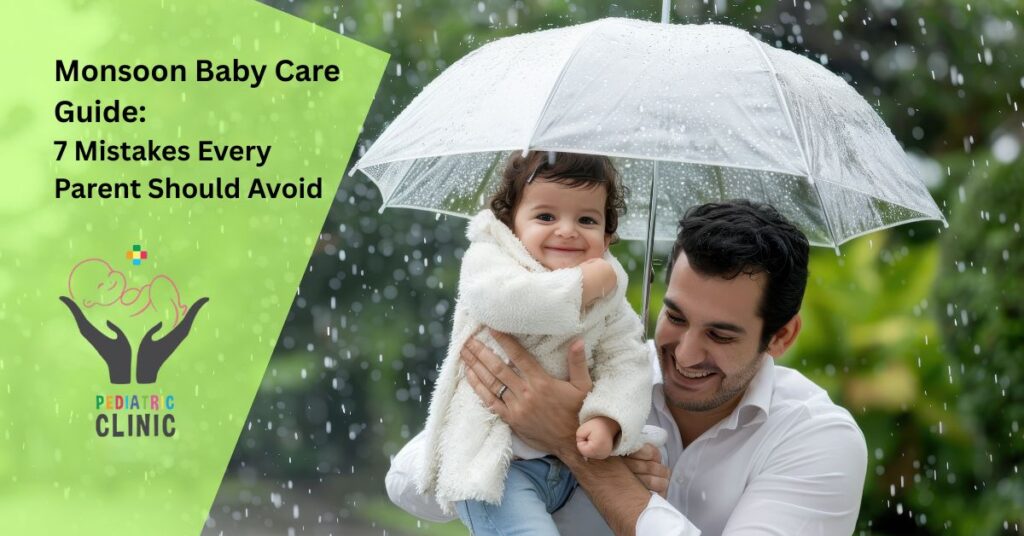Baby Care in Monsoon Requires Special Attention
Monsoon brings relief from the scorching heat but also increases the risk of infections, allergies, and hygiene-related complications—especially in infants and newborns. Monsoon baby care is not just about keeping the baby dry; it’s about maintaining proper hygiene, ensuring nutritional balance, and protecting against seasonal illnesses.
As a parent, it’s crucial to understand that monsoon care for babies requires more vigilance and informed choices. With guidance from experienced pediatricians, here are the 7 most common mistakes parents unknowingly make during monsoon, and how to avoid them to keep your child safe and healthy.
1. Ignoring Skin Rashes: Common Baby Skin Problems in Monsoon
During the monsoon season, moisture levels in the air are high, making the baby’s skin vulnerable to fungal infections, diaper rashes, and prickly heat. Many parents overlook early signs of these problems, assuming they’re normal.
Monsoon baby skin care should be your priority. Always keep your baby’s skin clean, dry, and moisturized with pediatric-recommended products. Using synthetic diapers for long hours can worsen rashes in humid weather.
Pointers:
- Use breathable cotton clothes during monsoon
- Change diapers frequently and keep the area dry
- Consult a pediatrician if rashes persist more than 48 hours
2. Delaying Vaccinations: Importance of Baby Vaccination During Monsoon
Some parents hesitate to take their babies out for vaccinations due to rain or humidity. However, delaying immunizations can expose infants to preventable diseases, which spike during monsoon.
Baby vaccination during monsoon must remain on schedule. Clinics like ours at Pediatric Newborn Clinic in Greater Noida West ensure sanitized environments and safe appointments even in monsoon.
Never skip or postpone any vaccine due to seasonal inconvenience. Pediatricians strongly advise timely vaccinations to protect your baby’s developing immune system.
3. Poor Ventilation: How Indoor Humidity Affects Baby Health
Monsoon often leads to closed windows and a lack of airflow, which can cause mold, allergens, and airborne infections to accumulate indoors. Babies are extremely sensitive to such environmental changes.
Proper monsoon baby care at home includes ensuring ventilation, using dehumidifiers if needed, and avoiding damp clothing or bedding. Ventilated, clean spaces help reduce respiratory risks and maintain healthy breathing patterns in newborns.
4. Overdressing the Baby: Choosing the Right Clothes in Monsoon
Parents often assume that more layers mean more protection from cold. However, during monsoon, overdressing can cause sweating and discomfort, leading to heat rashes and fungal infections.
Choose monsoon-friendly baby clothes that are lightweight, breathable, and moisture-absorbent. Cotton is ideal for this season. Avoid heavy fabrics and woollen caps indoors unless advised by a pediatrician.
Pointers:
- Check baby’s back for sweat or dampness
- Avoid plastic rain covers directly on baby’s stroller
- Use soft dry towels after every outing or bath
5. Feeding Mistakes: Not Adjusting the Baby’s Diet in Monsoon
Monsoon can disturb digestion in infants, especially in formula-fed or weaning-stage babies. Warm, easily digestible meals are ideal during this time. Avoid cold milk, raw fruits, or refrigerated baby food.
Monsoon baby diet care is about feeding fresh, lukewarm meals, sterilized bottles, and ensuring clean water consumption. Mothers who breastfeed must also eat light, warm, and immunity-boosting foods.
Pediatricians recommend avoiding junk, packaged, or preserved items for babies during this season—even in small quantities.
6. Using Mosquito Repellents Unsafely: Protecting Babies from Dengue and Malaria
With waterlogging and stagnant puddles, mosquito breeding spikes during the monsoon. Babies are at higher risk of mosquito-borne diseases like dengue, malaria, and chikungunya. However, applying strong repellents directly on baby skin is risky.
Safe mosquito protection for babies in monsoon includes using mosquito nets, repellents made especially for infants, and keeping the house insect-free. Never use coils or sprays around newborns without medical approval.
Avoid walks in mosquito-prone areas after dusk and dress your baby in full-sleeved cotton clothes when stepping outside.
7. Skipping Pediatric Visits: Why Regular Health Monitoring Matters in Monsoon
Some parents postpone routine pediatric checkups due to unpredictable rains or fear of catching infections at clinics. But this can delay early diagnosis of common monsoon illnesses in babies like viral fever, cold, or stomach infections.
Monsoon baby health monitoring must continue as per the pediatrician’s advice. A timely health check helps track growth, immunity, and potential monsoon-related symptoms. Our clinic ensures sanitized and safe consultations even during peak rain.
Early intervention leads to faster recovery and long-term immunity building.
Conclusion: Monsoon Baby Care Is a Responsibility, Not a Season-Long Task
Proper monsoon baby care isn’t just about reacting to issues—it’s about anticipating them and making well-informed decisions backed by pediatric advice. From hygiene to feeding to regular health checks, every step plays a vital role in your baby’s wellness during this unpredictable season.
At Pediatric Newborn Clinic, we offer comprehensive support, from monsoon baby health tips to vaccination tracking, personalized checkups, and newborn care consultations.
If you’re looking for expert pediatric care in Greater Noida West, trust our team to guide you through the season with care, safety, and reliability.
Need Trusted Monsoon Care for Your Baby? Consult Pediatric Experts Today
Don’t let the monsoon season compromise your baby’s health. At Pediatric Newborn Clinic, Greater Noida West, we provide safe, timely, and expert-led pediatric care tailored to your baby’s seasonal needs. From vaccinations and skin concerns to immunity and nutrition, our team ensures your child receives the attention they deserve.



